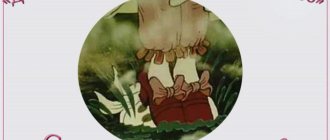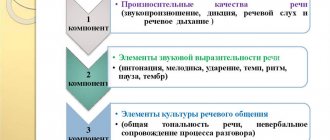Development of children's speech through the introduction of fiction
Development of children's speech through the introduction of fiction
KUZHUGET CH.H.
teacher of MBDOU kindergarten "Chechek" combined type
Kyzyl-Mazhalyk village
At all times, great attention has been paid to the development of speech. Thoughts about the need to develop speech in children are contained in the works of many famous teachers, writers, philosophers, such as Socrates and Plato, K.D. Ushinsky, L.S. Vygotsky, V.V. Vinogradov and others. And now, in our modern times, the problem of speech development in children does not go unnoticed.
It is no coincidence that in the Federal State Educational Standard, preschool education “Speech Development” is allocated as a separate educational area, which is one of the most important. It can be argued that the physical, aesthetic or social-communicative are no less important. Yes, they are all important, but is it possible for children to fully develop in any of these educational areas without speech, without communication, without communicative activities?
Preschool age is the most favorable for the development of speech and the formation of a culture of verbal communication. Therefore, today the issue of speech development in preschoolers is especially acute. For a child, the speech of adults is a role model, so the teacher needs to monitor his speech. It must be clear, correct and expressive using non-verbal means of communication: facial expressions, gestures.
Cognitive development always involves numerous questions and answers, explanations, problem posing, clarification, and reading. Physical development cannot do without rules, commands and explanations. Artistic and aesthetic - without artistic images, poems, literary texts, discussions. Already in the very name of the socio-communicative field there is a need to use speech means to implement the intended tasks. Therefore, the place of speech development in the full formation of personality is absolutely indisputable. Speech is a special type of activity that is closely related to sensory processes, memory, thinking, imagination, and emotions. All these processes, like speech itself, actively develop in early and preschool age, therefore the Federal State Educational Standard for Education pays great attention to the speech development of preschool children.
Thus, I consider fiction relevant as a condition for the development of speech.
The main goal of work on speech development and teaching children their native language is the formation of oral speech and verbal communication skills with others based on mastering the literary language of their people. The Federal State Educational Standard in the educational field “Speech Development” involves achieving this goal through problem solving.
Encouraging children to want to listen to fairy tales and read works of art;
instilling in children a love of books;
development of poetic hearing, intonational expressiveness of reading.
The child’s feelings develop in the process of assimilating the language of those works with which the teacher introduces him. An artistic word helps a child understand the beauty of his native speech; it teaches him an aesthetic perception of the environment and at the same time forms his moral ideas.
Unfortunately, in our age of information, children’s attitude towards books has changed, and interest in reading has begun to decline. According to research, already at preschool age children prefer watching television programs, cartoons, and computer games to reading.
In classes on familiarization with fiction, the main source of enriching children’s speech is the text of a work of fiction, which the teacher reads or tells to the children, and an additional source remains the speech of the teacher himself, commenting on the text. That is, I bring you to the point, dear educators, that even in the case of reading fiction, the main source of inspiration in learning your native language is YOU. How will you read the text, with the help of what significant elements will you convey the experiences of the characters. Children’s love for their native language and reading fiction depends on it.
What does fiction mean to a child? This is a magical world in which every child is happy to immerse himself and is a source of information about the environment, and a necessary condition for the normal speech development of children.
And the most important task of a kindergarten is the development of children’s coherent speech, which includes the ability to listen and understand coherent texts, retell them, as well as fostering interest and love for the artistic word.
Why is the literary word an effective means of moral development of a child’s personality? Yes, because in preschool age a child lives by feelings, with the help of them he perceives and understands the world around him. Through the art of words, children learn, comprehend and generalize the facts of life. Children often live in the world of literary heroes.
Preschool children are not yet readers, but listeners. The ability to listen to a literary work is formed in preschoolers in the process of education with the active influence of adults. In order to develop children's interest in fiction and cultivate a caring attitude towards books, a literary center is created in each group, this is a calm, comfortable, aesthetically designed place where children have the opportunity to communicate with books, look at illustrations, magazines, and albums.
In younger groups, a literary center is not organized right away, since children do not have the skill to use a book and often use it as a toy. The literary center should have 3–4 books, individual pictures, and thematic albums. Books should have a small amount of text and bright illustrations. The teacher accustoms children to using the book independently, looks at the illustrations, reads the text, talks about the rules of use (do not tear, do not crumple, do not draw).
In the middle group, a literary center is organized from the very beginning of the year with the participation of children. On the display shelves there are 4 - 5 books, materials for repair (paper, glue, scissors, etc.), different types of theater, filmstrips, a tape recorder with audio cassettes, a collection of tongue twisters and tongue twisters.
In the senior and preparatory groups, the content of books in the book corner becomes more diverse. The number of books on display increases to 8–10; children can use the library independently. This includes Russian folk tales, fairy tales of the peoples of the world, children's magazines, works of Russian classics, works about nature, educational literature, maps, atlases, encyclopedias. In addition to reading and storytelling, such forms of work as conversations about books are also used, exhibitions, conversations about writers and artists, and literary matinees are organized.
Thus, all forms of work to introduce children to fiction foster interest and love for books and shape future readers.
The methods of working with fiction have identified those pedagogical means that help increase the level of children’s perception of literary works. And types of activities to familiarize children with fiction
thematic (introducing children to the leading themes of children's literature);
theoretical (familiarity with theoretical concepts accessible to the age characteristics of children);
creative (development of children's literary creativity);
analytical (analysis of the text with the aim of deep penetration into its meaning).
At preschool age, children are introduced to fiction: fairy tales, stories, poems and works of “small forms” of folklore: nursery rhymes, songs, tongue twisters, etc.
To work on speech development through reading fiction, I use a variety of methods and techniques:
Verbal method
Practical method;
Visual method.
Practice shows that speech formation is a labor-intensive and responsible job that requires a certain system and patience on the part of the teacher in selecting teaching tools and methods. It is very important to be able to use any activity to develop speech, and above all, the leading one – gaming.
The game has a great influence on the development of speech. The game situation requires from each child included in it a certain level of development of verbal communication. If a child does not know how to express his wishes regarding the course of the game, if he is not able to understand the verbal instructions of his playmates, then he will be a burden to his peers.
A universal method of consolidating knowledge and skills in kindergarten is a didactic game. It is used to solve all problems of speech development and is a practical method in working on the development of children's speech. Also, work with a familiar literary text can be carried out using dramatization games, tabletop staging, and other types of theatrical and gaming activities that contribute to the relaxed and effective consolidation of knowledge of a literary work.
Thus, by helping children master the language of a work of art, I create conditions for the development of children’s speech. The group has updated the literacy corner. The following are widely available: encyclopedias for preschoolers, fairy tales in Russian and Tuvan (native) languages, and albums. The board game “Tell a Tale” is a visual didactic guide, stories based on the pictures of the fairy tales “The Ryaba Hen”, “Turnip”, “Teremok”, “Dort Alyshky”, “Anajzhygash bile kymyskayak”, etc. Children independently tell each other fairy tales and stories. I have selected didactic material for educational games, manuals, and children's literature, taking into account the age, interests, and levels of children.
When introducing fiction and teaching how to write stories, I widely use mnemonics. Together with the children, we talk through the text, look at the illustrations and track the sequence of the previously prepared model for this work.
But I believe, and I think that you will agree, that model schemes can be used in other classes.
And family reading is the best form of collective communication. If reading is part of the lifestyle of adult family members, the child picks up and absorbs it. For any child, reading is, first of all, communication with parents. By depriving him of reading together, you are depriving him of perhaps his happiest moments.
To orient parents in the book world, in the parent corner I place a list of literary works and recommended children's literature for home reading. The “New Children's Literature” section is constantly running, introducing parents to new children's book publications.
There are a lot of poems and songs in the program for memorizing; poems in Russian and Tuvan are divided into months. Even the parents are interested, they have started notebooks, they write poems for home and teach together in their dreams. A program list of poems was compiled for all groups.
Since the majority of the program provides fiction only in Russian, it is very difficult to translate into Tuvan, so I translated some Russian stories and fairy tales into my native language and collected them into one collection. Based on the exchange of experience with colleagues, it is clear that everyone faces such problems.
I plan to release these materials in the future as a collection “The Magic Chest”, fairy tales, short stories, fables in Russian and Tuvan languages.
We will even divide the riddles according to lexical topics in Tuvan and Russian.
An indicator of the good development of children’s speech was participation in the kozhuun reading competition dedicated to March 8; pupil Seren-Dorzhu Yana took 1st place and 2nd place in the kozhuun drawing competition dedicated to “Mother’s Day”, “Father’s Day”, “Children’s Day”.
Bizhik Mongush Kuderek republic chergelig tyva tooldarnyn plotternige undesilettingen churuktar mooreii 3-ku cherni algan.
The diploma is awarded to Khertek Evgeniy in the category “Best Young Actor” in the regional theater competition “Golden Chest of Fairy Tales”.
In preparation for the competition, children learned not only to pronounce each word correctly, but also to emotionally convey the meaning of the work. At the same time, the teacher sought to develop the child’s speech activity, tactfully correcting mistakes (incorrect stress in a word or grammatical error).
In my free time from work, I write poetry, fairy tales for children, and draw. My own works were repeatedly published in the local newspaper “Khemchiktin Syldyzy”, in the republican newspaper for children “Syldyschygash” R.T., in the socio-political newspaper “Shyn” R.T. Magazine "Bashki".
So, to summarize, it can be noted that fiction is a universal developmental and educational tool, taking the child beyond the limits of the directly perceived, immersing him in possible worlds with a wide range of models of human behavior and orienting him in a rich linguistic environment.
The book has always been and remains the main source of formation of correct, developed speech. Reading enriches not only the intellect and vocabulary, it makes you think, comprehend, forms images, allows you to fantasize, and develops your personality in a multifaceted and harmonious way. This should be realized, first of all, by adults, parents and teachers who are involved in raising a child, and instill in him a love of fiction, teach the child to love the process of reading itself.
List of used literature:
Alekseeva M.M., Yashina V.I. Speech development of preschool children. M.: Mosaic-synthesis, 2000.
OH. Aldyn-ool., G.T. Nazytpay. Tyva uruglar nursery-sadtarynga chugaa sayzyradylgazynin programzy. K.: 2002.
Vinarskaya E.N. Early speech development of a child and problems of defectology. M.: Education, 1987. – 160 p.
Speech development classes in kindergarten. Program and notes. Ed. Ushakova O.S. – M.: Publishing house “Perfection”, 1998. – 368 p.
Korotkova O.N., Korotkova G.N. Speech development in children in kindergarten. Yaroslavl: Academy of Development, 2008. -192 p.
Suvakpit O.O., B.M. Mongush., Kara-kuske Ch.K. Tyva uruglar nursery-sadtarynga nomchulga nomu.
Maksakov. A.I. Is your child speaking correctly? – M.: Education, 1982.
Methods of speech development for preschool children. Fedorenko L.P., Fomicheva G.A., Lotarev V.K., M.: Education, 1977
Nosenko N.P. Speech development of children in preschool educational institutions (in diagrams and tables). Tutorial. – M.: Center for Pedagogical Education, 2009. – 96 p.




